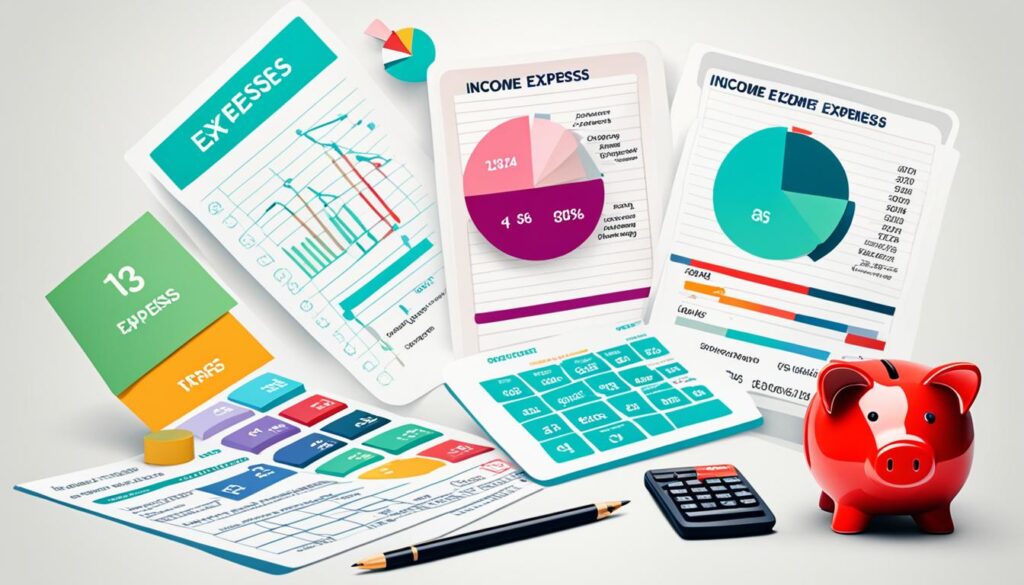Have you ever felt that budgeting is a restricting and tedious task, holding you back from living your dreams? Well, it’s time to challenge that notion. According to the Momma Has Goals Instagram post, “Budgeting isn’t about limiting yourself—it’s about making the things that excite you possible.” This sentiment suggests that budgeting is not just about saving and cutting expenses, but rather a powerful tool for transforming our dreams into reality and achieving financial freedom through mindful planning.
Key Takeaways:
- Budgeting empowers us to achieve our aspirations, not constrain them.
- By understanding our income and expenses, we can make informed decisions and gain control over our finances.
- Budgeting helps us calculate and mitigate financial risks, ensuring we stay focused on our long-term goals.
- Embracing budgeting as a lifestyle choice fosters financial discipline and a mindful approach to money management.
- Consistent budgeting, coupled with celebrating milestones, can lead to long-term financial security and success.
So, are you ready to unlock the true power of budgeting and transform your financial future? Let’s dive in and explore how this simple yet powerful tool can empower you to live the life you’ve always dreamed of.
Click on the link below for more details
Budgeting, a seemingly mundane task, holds the key to unlocking our financial freedom and transforming our dreams into reality. As a financial accountant’s commentary highlights, the power of budgeting extends far beyond simply tracking income and expenses. It is a structured framework that empowers individuals, businesses, and organizations to manage their finances effectively, achieve their goals, and ensure long-term financial stability and success.
Transforming Dreams into Reality
By providing a clear understanding of our income and expenses, budgeting enables us to set realistic financial goals and strategies. Whether it’s saving for a dream vacation or reducing debt, budgeting outlines the necessary steps and timelines to make these aspirations a tangible reality. Through this mindful planning, we can allocate our resources in a way that aligns with our values and priorities, ensuring that our spending decisions support the fulfillment of our desired outcomes.
Financial Freedom Through Mindful Planning
Budgeting empowers us to predict and stabilize our cash flow, a crucial element in maintaining financial stability and making informed decisions about our finances. By prioritizing expenses based on available resources, we can decide where to allocate our funds in a way that prevents overspending and ensures we have sufficient funds for our essential needs. This structured approach to financial management enables us to take control of our finances, minimize financial risks, and ultimately achieve the financial freedom we seek.
Effective budgeting starts with understanding our income and expenses. By creating a comprehensive plan to manage our financial resources over a specific period, such as a month or a year, we can gain a clear picture of our overall financial situation. This understanding empowers us to make informed decisions about our spending and ensure that we have the necessary funds to cover our essential needs, from rent and utilities to groceries and other basic necessities.
Preventing Overspending
One of the key benefits of budgeting is its ability to prevent overspending. By closely tracking our income and expenses, we can identify areas where we might be overspending and make adjustments to align our spending with our financial goals. This not only helps us avoid accumulating debt but also ensures that we have the resources to prioritize our essential needs, such as housing, food, and utilities.
Ensuring Funds for Essential Needs
Budgeting also helps us allocate the appropriate funds for our essential needs. By having a clear understanding of our income and expenses, we can confidently set aside the necessary resources to cover our basic living costs, such as rent, utility bills, and groceries. This financial discipline ensures that we maintain a stable foundation, allowing us to focus on achieving our long-term financial objectives without the burden of unmet essential needs.
Setting Financial Goals and Strategies
Budgeting is a powerful tool that enables us to not only understand our financial situation but also set meaningful goals and strategies to achieve our dreams. Whether it’s saving for a long-awaited vacation, making a major purchase like a new home, or effectively reducing our debt, budgeting provides the framework to turn these aspirations into reality.
By incorporating savings targets into our budget, we can systematically set aside funds for those big-ticket items that bring us joy and fulfillment. Whether it’s an exotic getaway or a down payment on a house, budgeting empowers us to break down these savings goals into manageable, step-by-step plans. This structured approach ensures we make steady progress towards our desired financial objectives, allowing us to enjoy the fruits of our labor without compromising our overall financial well-being.
Reducing Debt Effectively
Budgeting also plays a crucial role in helping us reduce our debt efficiently. By incorporating debt payments into our budget, we can prioritize debt reduction strategies and identify opportunities to pay off our debts at a faster pace. This structured approach not only helps us save on interest charges but also frees up resources that can be redirected towards building wealth, investing in our future, or pursuing other financial goals.
Through setting financial goals and implementing targeted strategies, budgeting empowers us to transform our dreams into tangible achievements, paving the way for a more secure and fulfilling financial future.
As we navigate our financial journeys, budgeting empowers us to prioritize our expenses based on our available resources. This allows us to make informed decisions about where to allocate our money, ensuring that our spending aligns with our core values and priorities. By carefully prioritizing expenses, we can direct our funds towards the things that matter most to us, whether it’s saving for a dream vacation, investing in our education, or supporting our loved ones.
Aligning Spending with What Matters Most
Budgeting is not just about cutting back on expenses; it’s about aligning our spending with our personal values and long-term goals. By clearly understanding our income and expenses, we can make strategic choices that reflect our priorities and aspirations. This empowers us to allocate resources towards the activities, hobbies, and experiences that truly enrich our lives, rather than mindlessly spending on things that don’t align with our deeper needs and desires.
In addition to prioritizing expenses, budgeting enables us to predict and stabilize our cash flow, which is essential for maintaining financial stability and making well-informed decisions. By forecasting our income and expenses over a specific period, we can anticipate potential cash flow challenges and proactively implement strategies to mitigate them. This level of financial foresight allows us to plan for unexpected expenses, allocate funds towards savings and investments, and ensure that we have the resources needed to cover our essential obligations.
By prioritizing our expenses based on our values, aligning our spending with what matters most, and effectively managing our cash flow, budgeting becomes a powerful tool that empowers us to take control of our financial well-being and work towards a more fulfilling and prosperous future.
Accelerating Debt Reduction
Budgeting plays a crucial role in accelerating debt reduction for individuals and organizations alike. By incorporating debt payments into the budget, we can prioritize strategies that help us pay off our debts faster, ultimately improving our overall financial well-being.
One of the key benefits of budgeting in the context of accelerating debt reduction is the structured approach it provides. By allocating specific funds towards debt repayment, we can create a clear roadmap for tackling our outstanding balances. This strategic planning allows us to identify opportunities to increase our monthly debt payments, whether through finding additional income sources or reallocating funds from other budget categories.
Moreover, budgeting enables us to closely monitor our progress and make adjustments as needed. By regularly reviewing our budget, we can track the impact of our debt reduction efforts, celebrate milestones, and make informed decisions about where to focus our resources for maximum impact. This level of financial visibility and control is crucial in accelerating debt reduction and achieving our long-term financial goals.
In addition to the practical benefits, budgeting also fosters a sense of financial discipline and accountability. As we commit to our debt reduction plan and see the tangible results in our budget, we develop a stronger commitment to maintaining our financial discipline. This, in turn, reinforces our ability to accelerate debt reduction and ultimately reach a state of financial freedom.
By embracing budgeting as a tool for accelerating debt reduction, we empower ourselves to take control of our finances, strategically allocate resources, and make steady progress towards a debt-free future. It’s a powerful approach that can transform our financial landscape and unlock a world of possibilities.
Benchmarking and Course Correction
As we navigate our financial journey, budgets serve as vital benchmarks, allowing us to compare our actual income and expenses against our forecasted plan. By regularly reviewing and analyzing these variances, we can identify areas where we may have strayed from our intended course and take corrective actions to get back on track.
Identifying Variances and Taking Action
Carefully monitoring our budget provides us with the essential data to pinpoint any discrepancies between our projected and actual numbers. Whether it’s an unexpected expense or a higher-than-anticipated income, recognizing these variances is the first step towards making informed decisions and achieving our financial objectives.
Armed with this knowledge, we can then take proactive steps to adjust our spending, redirect funds, or even revise our overall financial strategy. By benchmarking our progress and making timely course corrections, we position ourselves to stay focused and on target, ensuring that we make the most of our resources and ultimately reach our desired financial goals.
Achieving Financial Objectives
Budgeting is not just about creating a plan; it’s about continuously evaluating our progress and making necessary adjustments along the way. By regularly reviewing our budget and identifying areas for improvement, we can adapt our strategies, optimize our spending, and unlock new opportunities to accelerate our journey towards financial success.
Whether it’s saving for a major purchase, reducing debt, or building a robust emergency fund, our budgets provide the roadmap and the means to achieve our financial objectives. By embracing this dynamic and iterative process, we empower ourselves to make informed decisions, seize promising opportunities, and ultimately transform our financial dreams into tangible realities.
Preparing for Unexpected Expenses
Budgeting isn’t just about managing our day-to-day finances; it’s also a powerful tool for preparing us to weather unexpected financial challenges. By incorporating an emergency fund or buffer into our budget, we can mitigate the impact of unexpected expenses and build a strong foundation of financial resilience and stability.
Mitigating Financial Challenges
Life is full of surprises, both pleasant and unpleasant. When unexpected expenses arise, such as medical bills, car repairs, or home emergencies, it’s easy to feel overwhelmed. However, with a well-crafted budget that includes an emergency savings account, we can proactively mitigate these financial challenges and avoid being caught off guard.
By setting aside a portion of our income specifically for unexpected expenses, we build a financial cushion that provides us with a sense of security and control. This resilience and stability allows us to navigate through turbulent times without jeopardizing our long-term financial goals. With a solid emergency fund in place, we can focus on achieving our dreams, confident that we have the resources to handle life’s curveballs.
saving, calculating risk, staying focus, financial risk
Budgeting empowers us to save for the future, calculate and mitigate financial risk, and stay focused on our long-term goals. By creating a structured plan for managing income and expenses, budgeting helps us allocate resources towards saving for the future, whether it’s for retirement, a down payment on a home, or other long-term objectives.
Saving for the Future
Through budgeting, we can prioritize saving and ensure that a portion of our income is directed towards our long-term financial security. Whether it’s building an emergency fund, saving for a child’s education, or investing for retirement, budgeting provides the framework to make these goals a reality.
Calculating and Mitigating Financial Risk
Budgeting enables us to carefully examine potential financial risks and implement strategies to mitigate them. By understanding our income, expenses, and potential volatility, we can make informed decisions and ensure that we are well-positioned to weather any economic uncertainties that may arise.
Staying Focused on Long-Term Goals
By staying focused on our long-term financial goals, budgeting helps us make informed decisions and make steady progress towards our aspirations. Whether it’s saving for a dream vacation, paying off debt, or building wealth, budgeting provides the structure and discipline to keep us on track and working towards our desired financial future.

Empowering Individuals and Organizations
At the heart of effective budgeting lies the power to empower both individuals and organizations. By providing a structured framework for financial planning, control, and decision-making, budgeting equips us with the tools necessary to manage our finances effectively and achieve our goals.
Effective Financial Management
This structured approach to financial management enables us to make informed decisions, allocate resources efficiently, and ultimately attain our desired financial objectives. Whether we’re individuals striving for financial freedom or organizations aiming to ensure long-term success, budgeting is the key that unlocks the door to achieving our aspirations.
By empowering us to understand our income and expenses, set realistic financial goals, and prioritize our spending, budgeting empowers us to transform our dreams into reality. This systematic approach to financial management equips us with the clarity and focus necessary to navigate the complexities of managing our finances and make steady progress towards our long-term objectives.
Budgeting as a Lifestyle
The story shared in the second source illustrates how budgeting as a lifestyle can become a transformative choice, rather than just a temporary measure. The author’s elder sister’s consistent use of a shopping list and budget helped her control her spending and ensure her financial stability. This gradual shift in mindset and the development of financial discipline are key to embracing budgeting as a sustainable and empowering lifestyle.
Developing Financial Discipline
By incorporating budgeting into their daily routine, individuals can cultivate a strong sense of financial discipline. This discipline empowers them to make mindful decisions about their spending, saving, and debt management, ultimately leading to a more secure financial future. As the author’s elder sister demonstrated, the disciplined use of a shopping list and budget can effectively control spending and maintain financial stability over time.
Embracing a Mindful Approach
Adopting a mindful approach to managing finances is crucial for transforming budgeting from a limiting constraint into an enabling tool. By being present and attentive to their spending habits, individuals can align their financial decisions with their values and long-term goals. This mindful approach encourages them to prioritize their needs, allocate resources wisely, and make informed choices that support their dreams and overall financial well-being.

As the story illustrates, the gradual shift in mindset and the development of financial discipline are essential for embracing budgeting as a sustainable and empowering lifestyle. By cultivating a mindful approach to their finances, individuals can transform budgeting into a tool that enhances their lives, rather than constraining them.
As we embark on our budgeting journey, it’s important to remember that the key to success lies in starting small and staying consistent. The story shared in the previous section resonates with many of us, as we may have initially struggled with the idea of budgeting, much like the author’s initial resistance to writing down a shopping list.
Starting Small and Staying Consistent
However, as the author witnessed the benefits their elder sister experienced through her consistent budgeting practices, they too came to a realization of the true power of budgeting. This gradual shift in mindset and the development of financial discipline are essential to embracing budgeting as a sustainable and empowering lifestyle.
Celebrating Milestones and Victories
Along the way, it’s crucial to take a moment to celebrate the milestones and victories we achieve. Whether it’s successfully sticking to a budget for a month, paying off a debt, or reaching a savings goal, acknowledging these accomplishments can help us stay motivated and continue refining our budgeting practices. By embracing this budgeting journey with a sense of purpose and positivity, we can ultimately transform our financial lives and unlock the true potential of this transformative tool.
Conclusion
In conclusion, budgeting is not about limiting ourselves, but about empowering ourselves to transform our dreams into reality and achieve financial freedom through mindful planning. By understanding our income and expenses, setting financial goals and strategies, prioritizing our spending, and preparing for unexpected challenges, budgeting provides a structured framework that enables us, as individuals, businesses, and organizations, to manage our finances effectively, make informed decisions, and ultimately attain our desired financial objectives and long-term success.
Embracing budgeting as a lifestyle, with a focus on developing financial discipline and a mindful approach, can unlock the true power of this transformative tool. This shift in mindset can lead us to a more financially secure and fulfilling future, where we are able to align our spending with our values and priorities, and steadily progress towards our long-term financial aspirations.
The journey of budgeting may start small, but by staying consistent and celebrating our milestones and victories along the way, we can harness the budgeting empowerment to achieve financial freedom and make our dreams a reality through mindful planning. It is a powerful tool that, when embraced with dedication and a positive mindset, can truly transform our financial lives and unlock boundless possibilities.
FAQ
What is the key message about budgeting?
According to the Momma Has Goals Instagram post, “Budgeting isn’t about limiting yourself—it’s about making the things that excite you possible.” This suggests that budgeting is a tool for empowerment rather than constraint, enabling you to transform your dreams into achievable goals and attain financial freedom through mindful planning.
Why is budgeting important?
A financial accountant’s commentary highlights the universal importance of budgeting. It helps individuals and organizations understand their income and expenses, preventing overspending and ensuring enough funds for essential needs. Budgeting enables setting financial goals and strategies, such as saving for a vacation or reducing debt, by outlining necessary steps and timelines.
How does budgeting help with managing finances?
Budgeting provides a structured framework for financial planning, control, and decision-making. It helps you prioritize expenses based on available resources, decide where to spend your money based on what’s important to you, and predict and stabilize your cash flow. This empowers individuals, businesses, organizations, and governments to manage their finances effectively and achieve their goals.
What are the key benefits of budgeting?
Budgeting helps you understand your income and expenses, set financial goals and strategies, prioritize your spending, prepare for unexpected expenses, save for the future, calculate and mitigate financial risk, and stay focused on your long-term goals. It provides a structured framework that enables you to make informed decisions, allocate resources efficiently, and ultimately attain your desired financial objectives and long-term success.
How can budgeting become a lifestyle?
Budgeting can transform from a limiting constraint to an enabling tool that supports your dreams and long-term financial well-being. By adopting a mindful approach and developing financial discipline, budgeting can become a sustainable and empowering lifestyle choice. Starting small, staying consistent, and celebrating milestones along the way are key to embracing budgeting as a lifelong practice.


